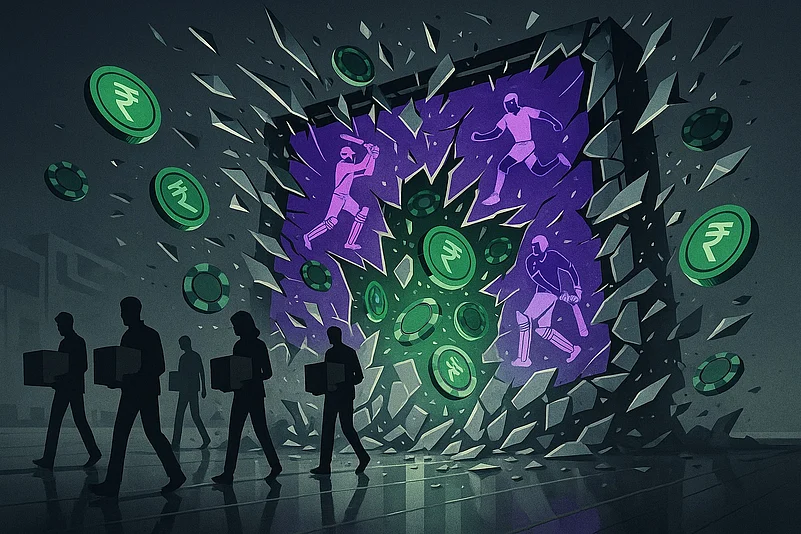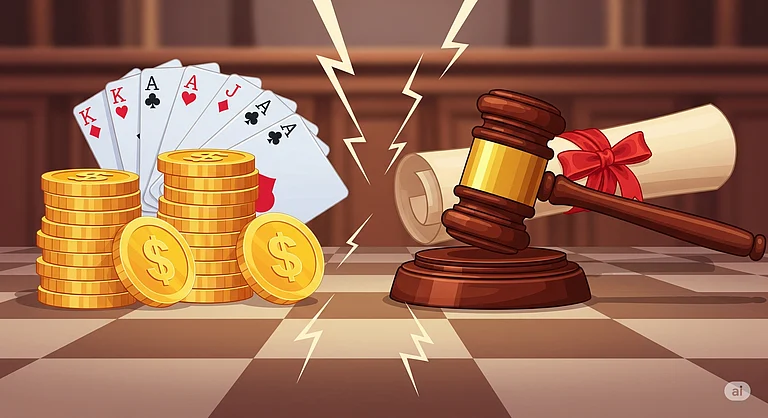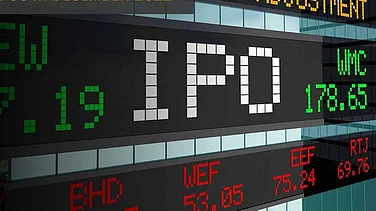
The new law has brought down the curtains on a ₹25,000-crore industry
Thousands lose jobs, face financial strain, with many already reeling from previous layoffs
Critics call the ban “prohibition in disguise," warning it will drive users and capital to grey markets
A ₹25,000-crore industry. Gone. Just like that, in a flash. On August 21, 2025, Parliament passed the Promotion and Regulation of Online Gaming Bill, outlawing real-money online games, including advertisements and financial transactions. The law now also received the presidential assent.
In the hours following the legislation, employees across India’s gaming sector reeled in shock. For many, this was not just a job; it was a career, a livelihood, and in some cases, the foundation of a recently built life.
A 31-year-old technical lead based in Noida had spent nearly four years building her career at a mid-sized real-money gaming start-up. “The job is everything,” she said. “For people like us, for ourselves, it is everything.” She had recently married, was servicing a personal loan of ₹26,000 a month, and had dedicated nine years to gaming. When her company announced it was closing down, the news hit like a thunderclap.
“It all happened in one day, not even a full day,” she recalled. “We were reading the news yesterday, and by the next hour, the company announced it was shutting down. We felt like terrorists, like we had done something terrible, but we hadn’t.”
Her role had been hands-on and critical, managing a team of designers and developers, reviewing code, ensuring products were delivered on time, and maintaining backend game data for analysis and reporting. Gaming was more than work; it was a daily challenge, a field where she constantly learned new skills. “Gaming is something where you learn something new every day,” she said. “It’s not like developing one software app; it’s different visuals, new challenges, animations. I also play a lot of games myself.”
She had started in the gaming space in 2014 and moved between multiple real-money and casual gaming start-ups. She had never considered leaving the industry, drawn by its constant innovation and challenge. But with the regulatory ban, she now faces a difficult reality where restarting in another industry might mean a substantial pay cut, as companies value her experience in gaming but not necessarily in other sectors. Her current package, she noted, was ₹25 lakh, and starting from scratch elsewhere would likely be lower.
Shockwaves Through Unicorns and Start-Ups
The sudden move has industry leaders fearing widespread shutdowns, massive job losses, and a collapse in billions of dollars in foreign investments previously funnelled into the sector. A joint industry statement warns this could endanger over 200,000 jobs, disrupt 400 companies, and jeopardize crores in investments. Dream11, which derives over 90% of its revenue from paid contests, has already paused all paid contests following the Bill’s passage.
Even before the ban, MPL faced financial strain with the GST Council mandating a 28% tax on full deposit value for real-money gaming, regardless of whether the game is skill-based or chance-based. As an upshot, despite recording strong business performance in mid-2023, MPL had to take drastic measures by laying off about 350 employees, nearly half its workforce, while also cutting server and office infrastructure costs.
Other start-ups, with fewer buffers, were immediately impacted. The now shuttered Noida firm had grown from 10 technical employees to 80 in four years. “And now everything is gone,” the technical lead said.
The Human Impact
With past layoffs still fresh, the looming shutdowns have left employees on edge. “The job is still very important for me,” said a manager at a mid-sized gaming platform. “Even the top founders weren’t in the loop over the Bill.” His company, like many others, has shifted into winding-down mode, managing deposits and exploring possible pivots for its user base. “Within a few weeks, we hope to have some clarity on the next steps,” he added.
The sense of vulnerability is heightened by the sheer scale of the industry. Real-money gaming in India generates an estimated ₹20,000 crore in GST every year. Unicorns like Dream11 and MPL employ thousands, and beyond them lies an entire ecosystem — content creators, indie developers, payment aggregators — all now left out on a limb.
For employees, the financial strain is real and immediate. The Noida-based lead, newly married and already weighed down by EMIs, voiced her frustration at what the government’s decision had overlooked. “I have nine years of experience in this industry. The government cannot give me that back,” she said.
The personal stakes run deep. “My family is disappointed, but they trust that I will find a way forward,” said the Noida lead. Others have spouses working in the same industry, compounding the blow. As the Delhi-based manager put it: “Anyone stepping into the start-up world always has some job insecurity, but this is unprecedented. Even the top founders were blindsided.”
India’s real-money gaming sector is worth an estimated $3.6–3.8 billion, with forecasts putting it close to $9 billion by 2029. Dream11 is valued at $8 billion, while MPL stands at $2.3 billion. Advertising revenues of between ₹17,000 crore and ₹27,000 crore a year are at risk. Publicly listed gaming firms such as Nazara Tech and Delta Corp have already shed value since the Bill was passed.
Some platforms, including Games24x7 and Quizy, have scaled back or shut down operations, citing the combined weight of regulation and taxes. Analysts warn that the sudden bans could trigger not just job losses but also a flight of talent and capital to grey markets or overseas hubs.
The government, for its part, defends the ban as a shield against addiction, fraud and money laundering. The Bill establishes a National Gaming Authority to regulate legal formats such as e-sports and social or educational games. Penalties are stiff: operators face up to three years in prison and fines of ₹1 crore; advertisers risk two years and fines of ₹50 lakh.
Critics dismiss the measure as prohibition by another name. Anupam Mittal, founder of People Group, warned that the ban could put at risk advertising revenues of ₹27,000 crore annually and drive users to unregulated markets.
Yet, employees are already looking ahead. Many see their skills as transferable to other parts of the tech sector. “Gaming might not be an option anymore,” said a techie. “But the skills I have—data, programming, leadership—can be applied elsewhere. It just means starting over.”
For now, their days are spent winding down projects and saying farewells. “We are still in the office, saying our goodbyes,” said one worker. “Officially, it’s our last day today, though a few of us might stay back to wrap up loose ends. It’s hard, really hard.”
The clash highlights the difficulty of balancing regulation and innovation. India wants to curb social harms, but sudden prohibitions risk hobbling a young industry, idling talent and unnerving investors. For employees, the future is uncertain. Yet there is resilience, and a recognition that the tools honed in gaming can be redeployed elsewhere. As one put it, “I will continue in tech, even if it’s not gaming. I have to rebuild, but I have the tools to do it.”





































